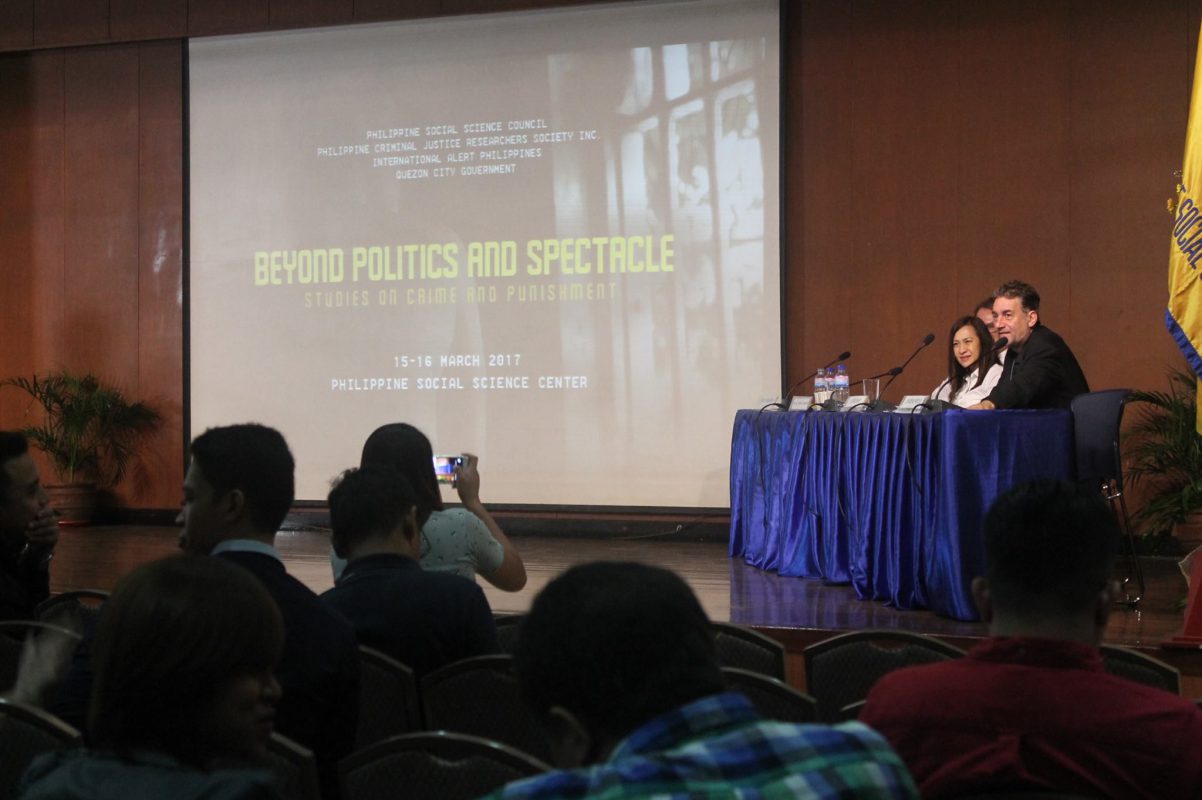Social science professors cite stance on pending criminal justice bills at PSSC’s criminality conference
- Posted on

Two social science professors weighed in on recent legislative proposals to restore the death penalty and lower the age of minimum criminal liability at the conference “Beyond Politics and Spectacle: Studies on Crime and Punishment” organized by the Philippine Social Science Council and the Philippine Criminal Justice Researchers Society Inc. on 15-16 March 2017 at the Philippine Social Science Center, Quezon City.
Mindanao State University sociology professor and former Akbayan Partylist Representative Mario Aguja presented his argument against death penalty, noting that the reasons for its abolition in the 13th Congress still hold true today.
Dr. Aguja stated that members of the 13th Congress viewed death penalty as anti-poor as most inmates finished only elementary education and were in occupations associated with the lower socioeconomic class, such as construction, transport, and service work.
Moreover, the country’s judicial system remains flawed, which increases the risk of judicial errors and corruption. Of the 672 death penalty cases reviewed by the Supreme Court, only 171 (25.45%) were affirmed while the remaining cases were either modified, remanded, or acquitted. These 672 cases took the Supreme Court eight years to review.
Lawmakers also strongly argued that death penalty is inhuman and violates one’s right to life. Moreover, contrary to popular belief, death penalty has not been an effective deterrent to crime.
Dr. Aguja said that instead of reinstating the measure, the government should focus on reforming and strengthening the police, justice and penal systems to deter criminality.
He stressed that there is a social reason for the commission of crime. The state should not just focus on penalizing the individual perpetrator as this absolves society, which has played a role in an individual’s commission of crime.
University of the Philippines psychology professor Elizabeth Protacio-de Castro opened her presentation by affirming her stand against the proposal to lower the minimum age of criminal responsibility from 15 to 9 years. Dr. de Castro argued that children are merely victims, not perpetrators, of crime.
She explained that studies by various institutions put the age of discernment at 15 years for Filipino children in school, and at 18 years for Filipino out-of-school youth. Neuroscientific studies on child development show that adults and children differ on level of cognitive and psychosocial development, level of decision-making capacity, and level of formation of personal identity. In other words, children are incapable of autonomous decision-making and are vulnerable to coercion.
She added that according to the Psychological Association of the Philippines (PAP), children in conflict with the law (CICLs) are less likely to distinguish right from wrong and are less capable of acting consistently with their right and wrong perception due to their mental health. The Council for the Welfare of Children describes the typical Filipino CICL as a 14- to 17-year old male who committed property-related crimes, uses drugs and alcohol, has low educational attainment and/or has stopped schooling, and belongs to a family of six.
Dr. de Castro presented data showing that CICLs are victims of circumstances. The Juvenile Justice Welfare Council notes that in 2016, 57% of CICLs come from poor families or families with no stable income; meanwhile, 28.6% of CICLs have separated parents while 23.6% have experienced family or domestic violence.
Dr. de Castro also emphasized that punitive approaches to children are not always effective. According to UNICEF Philippines, detention interrupts children’s schooling, isolates them from familial support, and makes their social integration more difficult. Being labeled as a criminal and being exposed to the formal criminal justice system may also lead to higher chances of re-offending, according to PAP.
Dr. de Castro argued that community-based intervention programs are more cost-efficient than placing CICLs in detention. Like Dr. Aguja, Dr. de Castro believes that restorative justice should be society’s responsibility.
In conclusion, Dr. de Castro recommended that the state build the capacity of stakeholders in juvenile justice and welfare, including the family, the courts, prosecutors, police, social workers, and public defenders. Instead of lowering the age of criminal responsibility, Dr. de Castro pushed for government and other stakeholders to address the underlying factors behind the commission of crimes.
